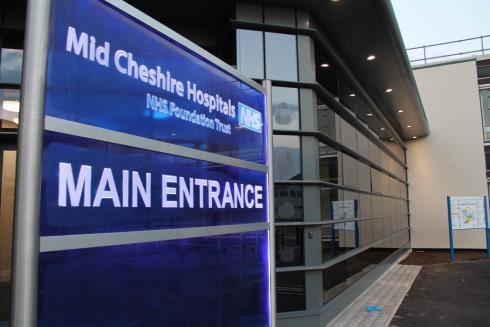
Residents in South Cheshire are being urged to follow healthcare professional advice on norovirus following a rise in cases in the local community.
Leighton Hospital has closed two wards to admissions and visitors after it was confirmed that a small number of patients had the illness.
Mid Cheshire Hospitals NHS Foundation Trust, which manages the hospital, has taken the step to reduce the risk of the stomach bug spreading.
The Trust is now reminding the public about the simple steps people can follow to help control the spread of infection.
Norovirus is one of the most common stomach bugs in the UK.
It’s also called the winter vomiting bug, although you can catch it at any time of the year.
The main symptoms are nausea, diarrhoea and vomiting.
Some people may also have a high temperature (38C or above), a headache and aching arms and legs.
To help prevent the spread of tummy bugs such as norovirus, we’re being advised to follow these tips:
– Good hygiene is vital in helping to reducing the chances of catching norovirus
– Wash your hands thoroughly with soap and water after you use the toilet or before touching or preparing food. Antibacterial hand gel alone does not stop a viral infection like norovirus
– Washing your hands properly should take around 20 seconds – the time it takes to sing ‘happy birthday’ twice
– When preparing food, which you shouldn’t do if you’re infected, all fresh produce should be washed thoroughly and surfaces should be wiped down and disinfected before cooking
– Wash used items of clothing separately on the hottest temperature for the fabric to kill germs
– Flush away any infected faeces or vomit in the toilet and clean the surrounding area well with a bleach based product.
Anita Swaine, head of nursing for infection prevention and control at Mid Cheshire Hospitals, said: “For most people, norovirus is an unpleasant illness that takes a day or two to recover from.
“It’s important to drink plenty of fluids during that time to prevent dehydration, especially in the very young, elderly or those with weakened immunity.
“We’re asking the public to help control the spread of infection by thinking carefully before visiting their friends and relatives in settings such as care homes and hospitals.
“We recommend that people do not visit if they have felt or are feeling unwell with diarrhoea, nausea or vomiting or have had flu or a fever over the past 48 hours.
“If your friend or relative is in hospital and has any norovirus symptoms or is on a ward that is closed, we ask that you do not visit unless absolutely necessary and that you do not bring any children under the age of 12.
“All of our visitors can also support by remembering to wash their hands when coming onto or leaving a ward area, and to use the hand gels provided at the entrance and exit to all patient areas.”
Self-treating at home is the best way to manage norovirus.
You don’t normally need to see your GP if you have the bug because there’s no specific treatment for it – antibiotics won’t help because it’s caused by a virus.
If you are concerned, please call NHS 111 or visit 111.nhs.uk as an alternative to presenting to your GP in person and to avoid putting others at risk.
Further information on norovirus visit https://www.nhs.uk/conditions/norovirus/


















Recent Comments